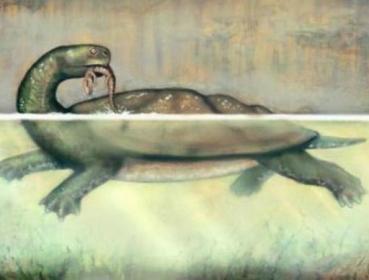Paleontologists say they've found fossilized remains of an ancient turtle with a shell the size of a small car that lived 60 million years ago in South America.
 |
This is a reconstruction of Carbonemys preying upon a small crocodylomorph. Credit: Artwork by Liz Bradford (UPI) |
Dubbed Carbonemys cofrinii, or "coal turtle," the fossil was discovered in a coal mine in Colombia, researchers from North Carolina State University reported Thursday.
The fossilized shell was about 1.71 meters long, about the size of a Smart car, and the fossilized skull had massive, powerful jaws that would have enabled the omnivore to eat anything from mollusks to smaller turtles or even crocodiles, researchers said.
"We had recovered smaller turtle specimens from the site. But after spending about four days working on uncovering the shell, I realized that this particular turtle was the biggest anyone had found in this area for this time period -- and it gave us the first evidence of giantism in freshwater turtles," NC State doctoral student Edwin Cadena said.
Smaller relatives of Carbonemys existed alongside dinosaurs but the giant version appeared five million years after the dinosaurs vanished, researchers said, during a period when giant varieties of many different reptiles, including the largest snake ever discovered, lived in this part of South America.
<관련 한글 기사>
충격! 악어 잡아먹는 거대 거북의…!
남아메리카에서 소형차만큼 커다란 거북의 화석이 발견되었다고 미국 고생물학자들이 17일(현지시간) 밝혔다.
이른바 “석탄 거북(학명: Carbonemys cofrinii)이라 불리는 이 거북의 화석은 6천만년전에 존재한 것으로 추정되며 콜롬비아의 석탄 광산에서 발견되었다고 한다.
화석을 발견한 미국 노스캐롤라이나 대학의 학자들은 이 거북이 연체동물이나 작은 거북, 심지어 악어까지 잡아먹었을 것이라고 추정했다.
이 거북은 공룡들이 사라지고 5백만년 후, 이 지역에 다양한 파충류들이 등장했던 시기에 나타났을 것이라고 한다.








![[Today’s K-pop] Blackpink’s Jennie, Lisa invited to Coachella as solo acts](http://res.heraldm.com/phpwas/restmb_idxmake.php?idx=644&simg=/content/image/2024/11/21/20241121050099_0.jpg)